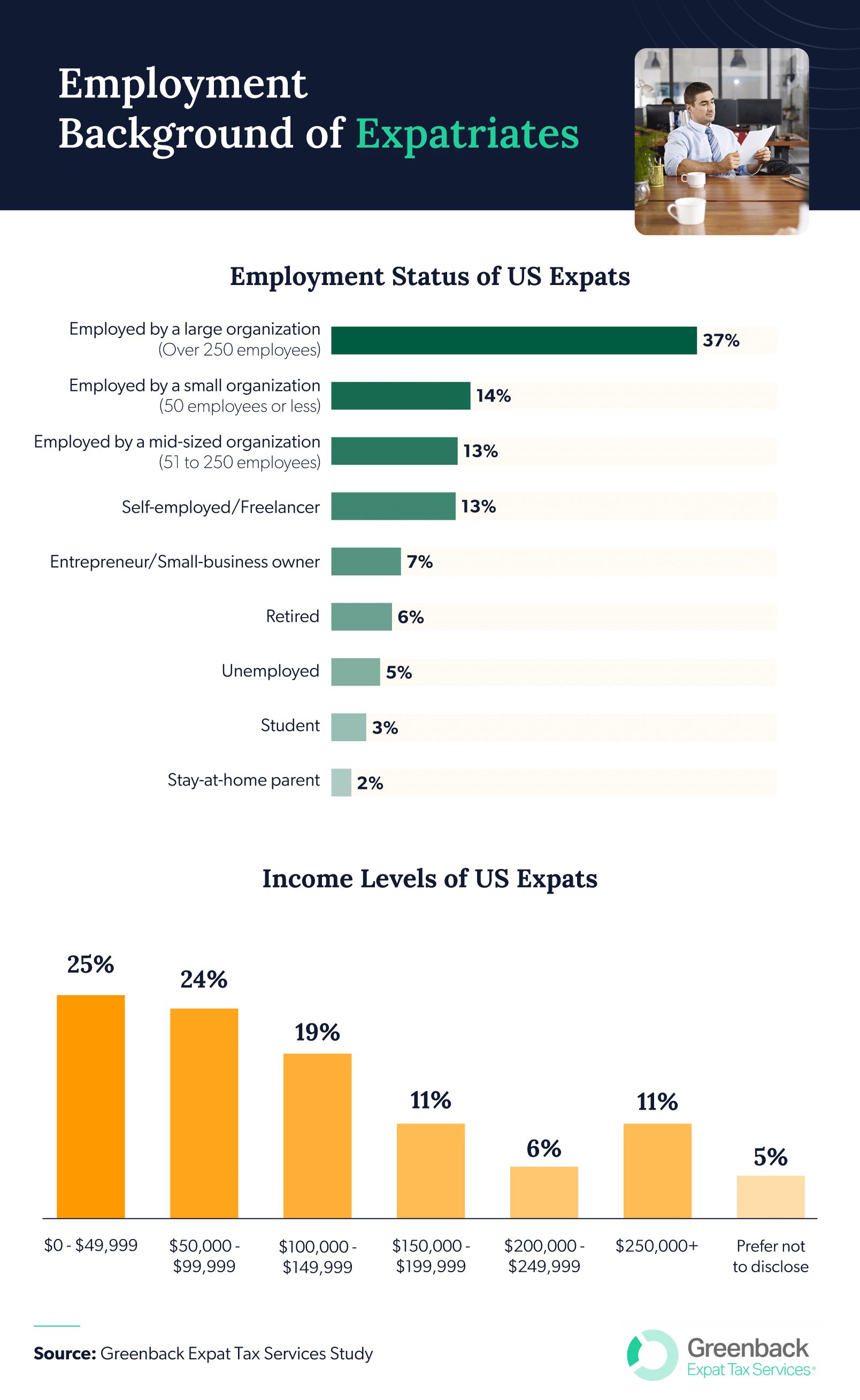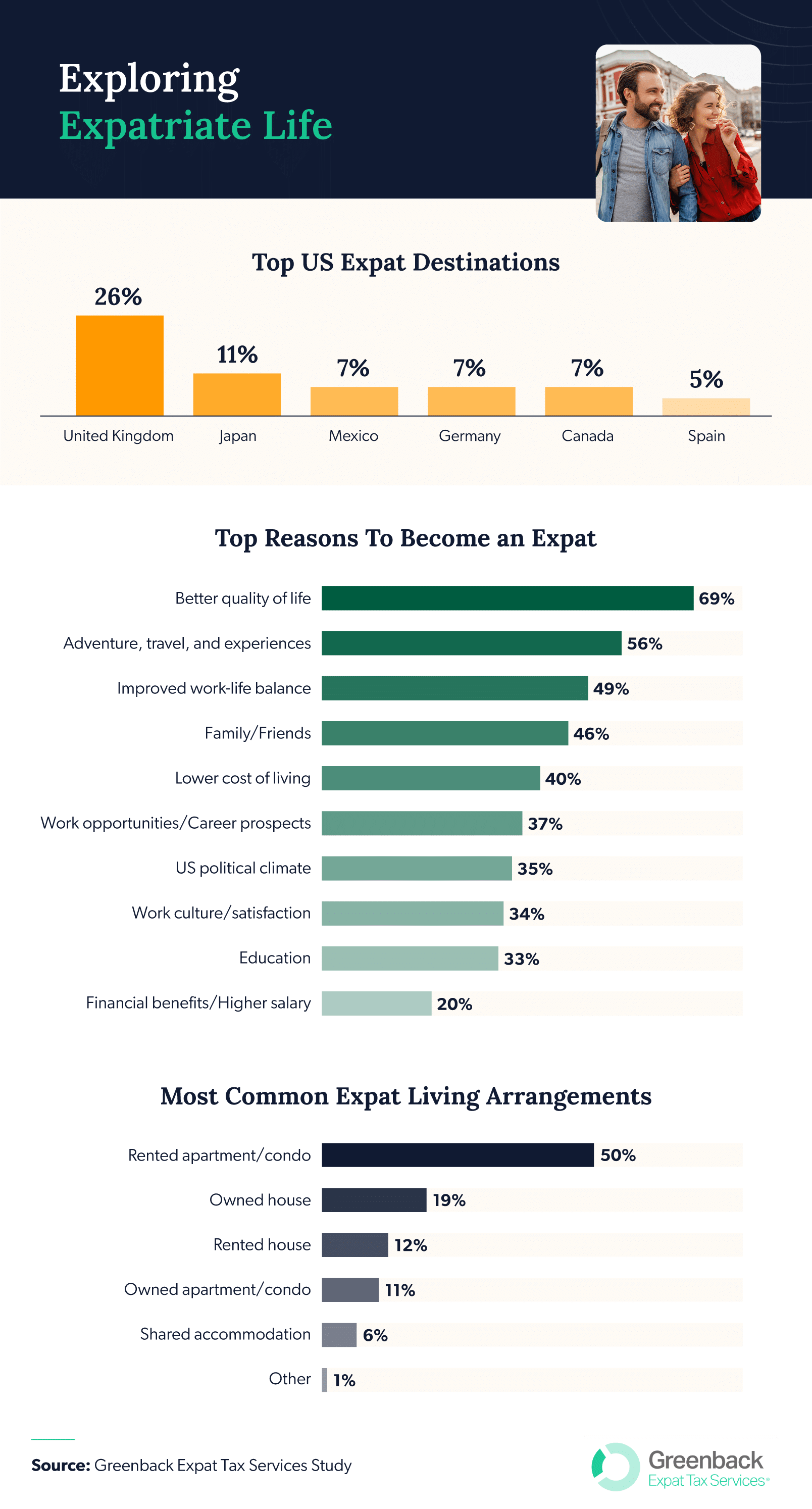2024 Expat Report: Work, Life, and Finances Abroad

At Greenback Expat Tax Services, our years of experience serving Americans abroad have given us unique insights into the expatriate journey. So, we wanted to know: What drives Americans to leave home for life abroad?
We set out to answer this question and more with a survey of over 400 US expatriates. Our findings include interesting trends in motivations, financial habits, and overall satisfaction with international living. From Asia to Europe, we also mapped where Americans have settled and looked into the reasons behind their choices.
This study not only informs our tax services but also provides valuable insights for current and prospective expats, as well as professionals serving this community.
Key Takeaways
- Nearly 1 in 2 US expats (49%) earn less than $100,000 annually, while 17% report earning over $200,000.
- The UK is the top US expat living destination, followed by Japan, Canada, Mexico, and Germany.
- Expats’ top reasons for leaving the US are better quality of life (69%), adventure and experiences (56%), and improved work-life balance (49%).
- 31% of US expats save or invest regularly, while 37% do not save or invest at all.
- 43% of US expats say tax implications are one of their biggest financial concerns, with 42% facing minor tax challenges and 12% facing significant ones.
- 82% of US expats enjoy living abroad more than in the US, with 30% recommending the lifestyle to others without any reservations.
- 44% of US expats plan to remain as expatriates indefinitely.
Expat Work and Income Trends
We first examined the employment status and income levels of US citizens living abroad to gather valuable insights into expats’ professional lives.

Large organizations (those with over 250 employees) were the primary employers of US expatriates, with 37% working for such companies. An entrepreneurial spirit was also evident among expats: 13% identified as self-employed or freelancers, while 7% reported being entrepreneurs or small-business owners.
Our research also revealed a wide expat income spectrum. The largest percentage of US expatriates (49%) earned less than $100,000 annually. On the other end of the scale, 17% reported annual earnings exceeding $200,000.
Top Expat Destinations and Motivations
We also wanted to know what destinations US expats prefer, why they want to live there, and what type of home they live in.

The United Kingdom was the top destination for US expats, followed by Japan, Canada, Mexico, and Germany. Other recent research shows that Americans aged 18-26 are most interested in moving to these same top three countries as well: the UK, Canada, and Japan.
Wherever Americans wanted to go, their primary reasons for choosing to live abroad were multifaceted:
- 69% cited a better quality of life.
- 56% sought adventure and new experiences.
- 49% aimed for an improved work-life balance.
Some of these preferences were generational and tenure-based. Among newer expats (those living abroad for less than a year), 53% cited the US political climate as a driving factor—the highest percentage across all expat groups.
Millennials were the generation most likely to mention this reason, with 40% citing political considerations. Gen Z expats showed different priorities: 45% were motivated by a lower cost of living, while 55% said educational opportunities were a key factor in deciding to move abroad.
Looking ahead, 6% of current expats said they plan to relocate to a different non-US country within the next year, demonstrating an ongoing desire for global experiences and lifestyle flexibility.
Financial Habits and Concerns
Next, we’ll shed some light on the financial behaviors and challenges of US citizens living abroad, including their saving, investing, and budgeting practices.

We found that 31% of expats were engaged in regular saving or investing activities, while 37% were not. Among those who said they save regularly, the average monthly savings amount was $399. For those who invested, the average monthly investment was $142.
Expat taxes can be complicated, so it tracks that 43% said tax implications were one of their biggest financial worries. Another 42% of expats have experienced minor tax-related challenges, while 12% reported significant difficulties in this area.
Budgeting challenges were also fairly common. One-third of US expats said they live paycheck to paycheck. This proportion is notably lower than the domestic US rate; it’s only half the percentage of Americans currently living paycheck to paycheck overall, according to the Bureau of Labor Statistics (66%).
Current Expat Satisfaction and Future Plans
Finally, to get a general overview of the expat experience, let’s broaden our view to the overall satisfaction levels and long-term intentions of US citizens living abroad.

Most US expats (82%) said they prefer their current lifestyle abroad to living in the US. However, opinions on recommending this lifestyle varied: 30% of expats endorsed it without reservations, while 59% recommended it with some caveats. Living abroad as a US expat can present challenges such as complex tax obligations, managing long-distance relationships with family and friends, and adapting to new cultural norms and environments.
Looking at future plans, 44% of US expats said they plan to remain as such indefinitely. This trend was most pronounced among millennials (49%). These findings suggest a growing trend of Americans embracing long-term international living, particularly among younger generations.
Global Citizens: The Evolution of US Expat Life
From the UK to Japan, Americans are forging new paths abroad, driven by the pursuit of a better quality of life, adventure, and improved work-life balance. While challenges persist, particularly in navigating tax implications, the majority of expats find their international experience rewarding.
With most expats preferring their current lifestyle to living in the US and many planning to remain abroad indefinitely, the benefits clearly outweigh the obstacles, like taxes, for many of them. As global connectivity continues to reshape our world, the expat experience offers valuable lessons in adaptability, cultural exchange, and personal growth.
Methodology
For the first section of the study, we leveraged internal data on US expatriates regarding their income and employment environment. For the second half of this study, we surveyed 418 US expatriates about their lifestyle and financial habits. Please note that some percentages in this study may not total 100% exactly due to rounding.
About Greenback Expat Tax Services
Empowering US expatriates with peace of mind, Greenback Expat Tax Services offers comprehensive tax preparation and consulting services designed for the unique needs of Americans abroad. Our team of seasoned professionals leverages advanced technology to deliver accurate, timely, and worry-free tax solutions.
Fair Use Statement
We encourage noncommercial use of this content. When sharing, kindly link back here to the source.
